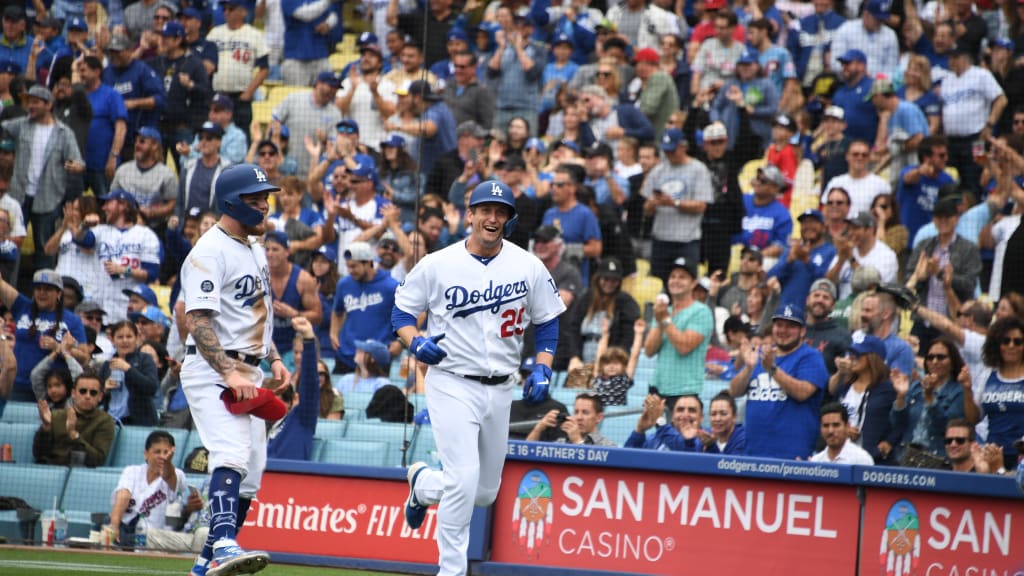
First to second, no problem. The next 90 feet, just fine. “I’ve got 180 feet in me,” David Freese says with a chuckle. “And after that, I don’t know what’s going to happen.”
The infielder’s 36-year-old body, lumbering as he barreled toward home, started to tilt and stumble forward around third base, where coach Dino Ebel remained steadfast in his pursuit to wave him in. If baseball were a sport that forced him to sprint consistently, instead of its stop-and-go pace, Freese maintains he would no longer be able to play. Running non-stop on feet that have undergone four surgeries simply wouldn’t be possible -- which was one of the myriad reasons that made this June 2 a rarity.
“I got in a wreck 10 years ago, before my Major League career even started, and busted my feet,” Freese says. “I came out of Triple-A (mashing the ball), and right before my big league career got in the wreck, and it hindered me. I think it affected my slugging. It affected my ability to do what I previously could do on a daily basis. I think being an everyday guy was a battle for me physically. This is just a good role for me and where I’m at and for my body, especially.”
Freese let manager Dave Roberts know, from the moment the Dodgers acquired him on Aug. 31, 2018, he was content with any role asked of him. He is no longer required to start 100 games a year. Typically, he knows when his services will be summoned ahead of time, allowing him to prepare a lower body that hasn’t always been there for him the last decade.
The former 2011 World Series MVP didn’t seem to mind that he started only half of his first 56 games played in 2019, often against the lefty pitching he’s demolished throughout his career. He understands the way the Dodgers handle him physically and put him in the best spot to succeed have him playing the best baseball of his career into his mid-30s.
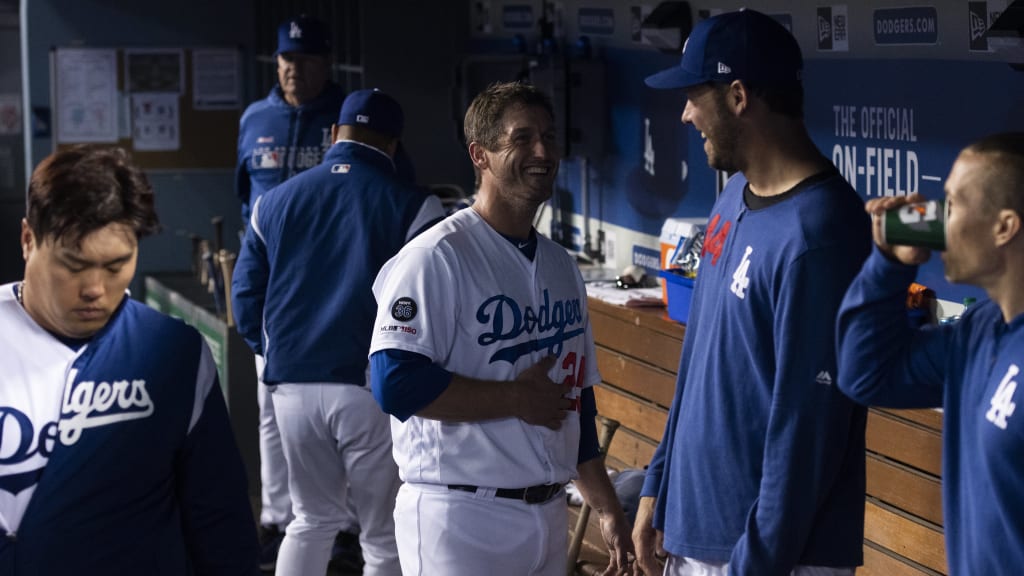
“Being around these guys and what they’re striving for and what they want to accomplish, that’ll put some fire under your tail a little bit,” Freese says, feeling rejuvenated on a team consistently in the hunt for a championship.
Freese is one of nine Major Leaguers with at least 100 plate appearances and an OPS of .999 or above this year. He is the only one of those nine above the age of 33. It could seem like a fluke, considering -- even in his All-Star 2012 season at age 29 -- he never finished a full season with an OPS better than .840.
But this was also a player who posted a 1.130 OPS after arriving in Los Angeles last September. The valued veteran, with a penchant for thriving when it matters most, proceeded to lead all Dodger position players in every slash line category during 14 postseason games (.364/.423/.773), finishing 8-for-22 with two home runs.

“I’m just enjoying it,” Freese says. “I think over the last 10 years, I’ve learned a lot about myself. I’ve grown. I’ve had seasons where I haven’t enjoyed it as much for various reasons, but I’ve definitely taken the time to gain perspective on the ‘whys,’ and I end up here. It just seems like a perfect fit.”
In addition to the coaches he’s around, he attributes his success to the way he feels and a team that understands what he needs to physically thrive. Rarely is he asked to do anything that will severely push his limits or his body, which he admits wasn’t as ready as normal on that June 2 evening. In a rare game in which his entrance came unexpectedly, he replaced an injured Matt Beaty and still managed to break a scoreless tie in the seventh by homering for the second straight game.
He did not score quite so gracefully the next time, nor was he offered the same chance to trot leisurely around the bases. After singling, he went from first to third as the ball sailed into right field on an error. He didn’t stop, tripping around third base but gathering himself just in time to beat the throw home as he sparked a Dodger win off the bench, again expertly filling a role few others would be so content with.
“The overarching message, what’s best for the team, he is on board in lock-step with me,” Roberts says. “And that’s huge.”
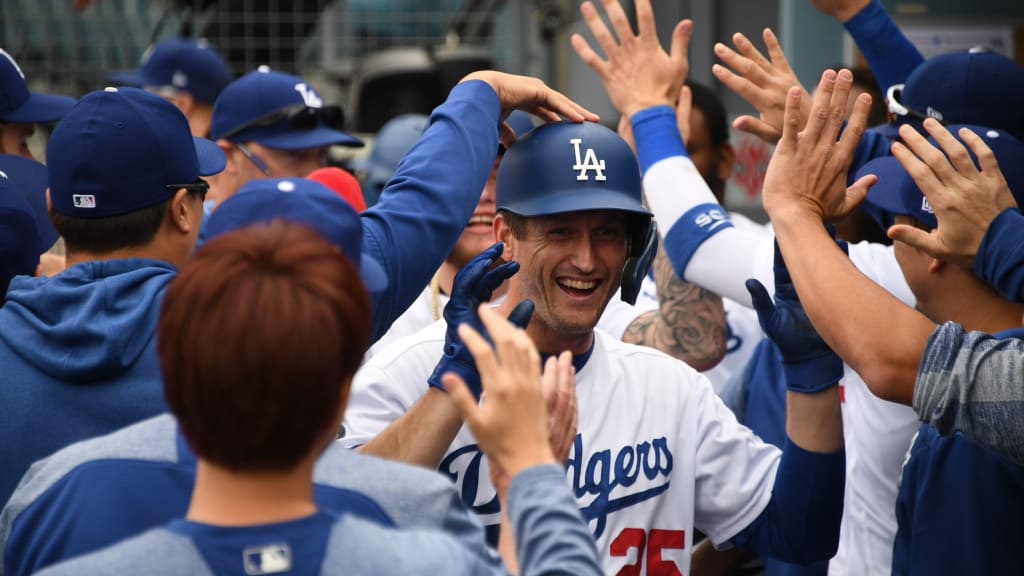
In the midst of a potential MVP season, Cody Bellinger started 70 of the Dodgers’ first 75 games -- a stark contrast to Freese, the only other Dodger player sporting a slash line better than .300/.400/.600 at the time.
During a 10-game hitting streak from the end of May through early June, Freese started only six times while belting eight extra-base hits. A week later, he homered as a pinch-hitter on June 11. Then he homered as a starter in his next game on June 13. Currently, no player in baseball with at least 20 plate appearances as a pinch-hitter is performing better than Freese, who started 9-for-21 with five extra-base hits in that role off the bench.
“It’s hard being an everyday player. It might be harder doing that,” Bellinger says. “He fits in great. I personally love hanging out with him, think he’s a great dude. But on the field, it’s super impressive what he does pinch-hitting and locking in at-bats.”
From 2013–18, Freese never hit more than 14 home runs in a season. He slugged below .475 each of those years. In 2019, in his first 100 at-bats, he had already belted seven home runs with a .610 slugging percentage.
Roberts gained enough intel on Freese before he was acquired to know he would bring a certain level of competitiveness. He knew he’d grind at-bats, help in the clubhouse and bring World Series experience, and he’s done all those things.
Did he know Freese still possessed this kind of power?
“No,” Roberts says with a smile. “I knew that his strength was to right-center field, and really no player’s power is the opposite way -- true, raw power -- but the balls he hits to right-center field, I didn’t know he could still do what he’s done. Hitting it like a left-hander, it’s amazing.”
Freese, whose .592 slugging percentage ranks 10th in the National League (min. 100 plate appearances), is certain he’s always possessed this ability. He’s now being afforded the time to get his body ready, and while his lower body still gives him some trouble at times - a hamstring strain has put him on the injured list multiple times this year - he believes he’s able to manage his ailments better now.
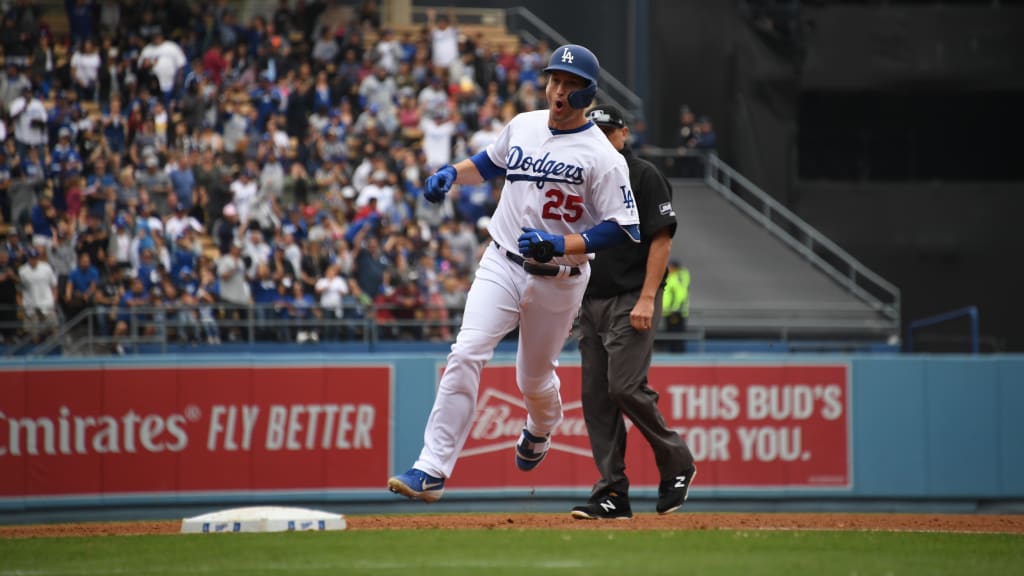
“I’ve had bone spurs in my feet for 10 years, and a lot of people are wondering about the power and this and that,” Freese says. “I’ve always had power, it’s just the toll day in and day out can wear on you. I’m fresh. I can get my legs for four at-bats, then get some days off pinch-hitting. It’s just working. It’s just a good spot for me.”
And it’s made baseball fun for him in a way it hasn’t always been.
Freese says he may put on a serious face when he plays, but it’s only a façade. He’s having a blast, and he thanks the organization from top to bottom for that, crediting the culture set up by president of baseball operations Andrew Friedman.
“It’s just everything about this place, to be honest -- how Andrew sets up the whole system, what they’re striving for, the personalities of management all the way down to players,” Freese says. “How Andrew and Doc (Roberts) have put together this team, it’s perfect. It’s absolutely perfect, with the guys, the ages, the talent, the desire, everything involved.”
The recipe reminds him of his Cardinal teams under Tony La Russa, the last of which won a World Series in 2011.
“Just the objective, the demand, the accountability,” Freese says. “I appreciate the accountability. I think having the accountability on you can make you a better player. It can push you. It can open doors to establish things you can accomplish that you never thought possible.”
Freese is encouraged to share those thoughts with those around him.
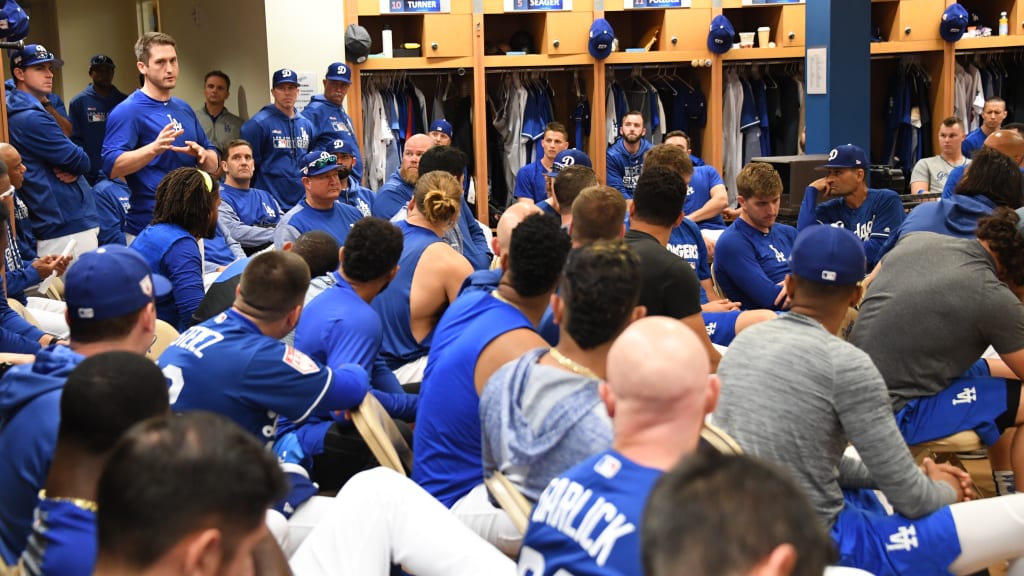
On a roster that’s already featured multiple rookies hit their first career home runs this year, and a nucleus craving another chance to finish off a title, Roberts knows Freese’s words and example carry weight -- especially when he’s willing to accept a role different than one he was previously accustomed to.
“When I get that buy-in from a guy like David, it’s very powerful,” says Roberts, who believes Freese has helped fill the void left by Chase Utley, another World Series champion revered for his experience and knowledge.
No one understands the value of that type of veteran presence more than the player who affectionately referred to Utley as “Dad.” Enrique Hernández, whose locker is next to Freese’s, sees how much the veteran is enjoying himself and rubbing off positively, and he notices the parallel to his old teammate.
“Every day he talks about it, how much he likes it here,” Hernández says. “We lost Chase, and in a way, he’s been that other veteran voice for position players. When a guy has done it for that long and been as productive as he has and come up big in so many different situations, his voice has a lot of credibility.”
Freese says he doesn’t ask many questions, but he listens. He wants to know what his teammates are trying to accomplish and work on. He feels invigorated in a place he knows he can win.
At 36 years old, he’s going to enjoy the end of his Major League ride.
“My perspective is different this late in my career,” Freese says. “I know my career’s kind of winding down, and I’m just fortunate -- so fortunate -- to be here. I still don’t even know how I ended up here. It’s just awesome.”